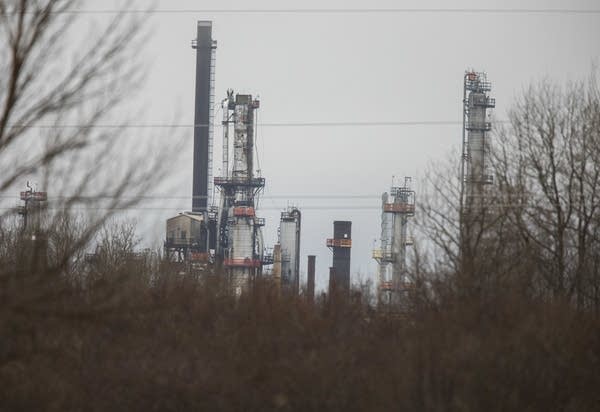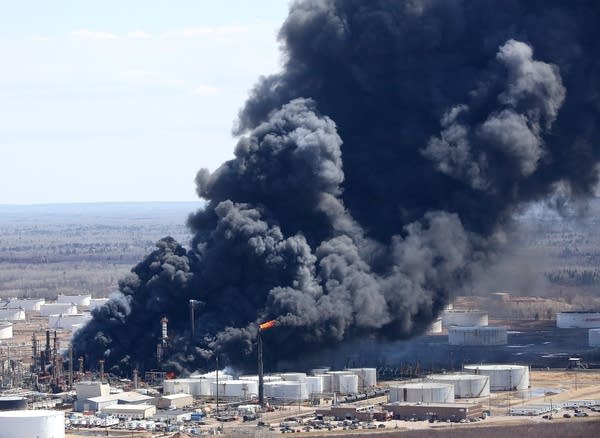Chemical raises concerns in wake of Superior refinery explosion, fire

Go Deeper.
Create an account or log in to save stories.
Like this?
Thanks for liking this story! We have added it to a list of your favorite stories.
Updated: April 30, 7:20 p.m. | Posted: April 29, 4:48 p.m.
Environmental monitoring is ongoing after an explosion and series of fires at Husky Energy's oil refinery in Superior, Wis., prompted an evacuation order last Thursday.
Officials with the Wisconsin Department of Natural Resources, the federal Environmental Protection Agency and the company continue to monitor air and water quality around the refinery. So far, monitoring since Thursday has not shown elevated levels of hazardous chemicals associated with the incident. But as the community recovers, questions are mounting over the refinery's use of hydrogen fluoride, a highly toxic chemical.
Turn Up Your Support
MPR News helps you turn down the noise and build shared understanding. Turn up your support for this public resource and keep trusted journalism accessible to all.
The hazardous chemical could have posed devastating health impacts for the port community of 27,000 had its tank been breached. However, Superior Fire Chief Steve Panger said the tank with hydrogen fluoride had special water systems around it that were immediately activated when the explosion occurred.
"Obviously, once we had a fire, we were concentrating on that area to make sure that didn't get compromised," Panger said.

At 15,000 pounds, the tank had less than the roughly 75,000 pounds of hydrogen fluoride it usually contains. Panger said they used that information along with plume models and weather patterns to determine the evacuation area. At the same time, he said the tank was being constantly cooled as crews tried to control the perimeter of the fire, which was about 150 feet away.
"The hydrogen fluoride tank, which has not been compromised, has a dedicated fire suppression system, and will be part of the full investigation," said Husky Energy spokesperson Kim Guttormson in an email Sunday.
She added that an initial investigation is underway in areas of the refinery that are safe to access. She also noted that workers will continue to be paid as cleanup and repairs begin.
Wisconsin's Gov. Scott Walker visited Superior Monday, touring the refinery to get an update on recovery efforts.
During a press conference, Walker said Husky needed to examine their plans to rebuild the refinery.

"And whether or not they rebuild in the same configuration or look at ways not only from their standpoint but working with the local, the county, the state and federal government about ways that not just go back to where they were but improve public health, public safety, natural resource management in a way that ensures people are first and foremost safe," he said.
The use of hydrogen fluoride raises the health risk from the Superior refinery if that chemical were ever to be somehow released, according to Fred Millar, a Washington, D.C.-based independent consultant on chemical risks with such facilities.
"The reason is using hydrogen fluoride instead of a non-disaster chemical alternative, which is sulfuric acid," said Millar. "Sulfuric acid will not put a big, huge toxic gas cloud into your community."
A 2011 report from the Center for Public Integrity said hydrogen fluoride is used by 50 out of 148 refineries nationwide. The chemical is highly toxic, according to Ron Koopman, a retired scientist with the Lawrence Livermore National Laboratory in California.
"It destroys tissue in horrible ways," he said. "If you get it on your skin, it works its way toward the bone destroying all of the tissue in between."
Hydrogen fluoride is used in refineries as part of the alkylation process, and it's used to make higher-octane gasoline. Koopman said it's an acid that attacks mucous membranes and can cause lung damage when people are exposed to it, whereas sulfuric acid doesn't have the potential to become airborne if released. However, Millar said it's a major effort for refineries to switch from hydrogen fluoride to sulfuric acid.
"It's a huge conversion deal," said Millar. "Costs millions of dollars."
The Center for Public Integrity puts that cost somewhere between $50 million and $150 million for each refinery.
Superior Mayor Jim Paine said the refinery's use of hydrogen fluoride — also known as hydrofluoric acid — will be part of conversations going forward.
"There are refineries that don't use hydrofluoric acid for the refinement of gasoline," said Paine. "I think we do need to look at other options, but that's something we're going to be working on with the company going forward. We're still in a public safety and cleanup phase."
The United Steelworkers has urged refineries across the country to phase out the use of hydrofluoric acid, saying more than 26 million people are at risk in the event of a release.


